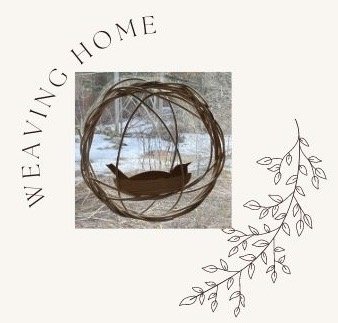February has been an interesting month. It has snowed for many days, there are almost two feet of packed snow on the ground, the deer have a hard time walking around, so you see them in the middle of the street, or walking up the plowed driveways. My neighbor uses his snowblower to make mazes for his dogs to run around. What a fantastic idea - building a snow labyrinth! One of the good things about snow, other than it covers and protects the ground, providing water when it melts, is that is covers up a multitude of sins. Ok, so we forgot to pick up a few toys, well we don’t have to look at them because they’re buried. We can look out at a pristine lawn, beautiful, white and sparkly. When the moon is full there is crystalline light reflected off the snow, when the sun is out we need sunglasses. That is a the gift of snow: covering, blinding, and letting us forget about all the mess we’ll have in the spring.
Yet this February, there has been a lot brought to our memory, or our awareness. We are excited there is a COVID vaccine, so there may be hope that we can hug our friends again in the future. We lament death, so many people are no longer here in a physical way and we will miss them. Many things have changed like the way we have meetings, our shopping habits, our worshipping habits.
Several of us watched the People’s Inauguration hosted by Valarie Kaur over ten days following the presidential inauguration. The program presented heart wrenching information about the injustices that have been perpetrated against people of color, people who are perceived by some as foreigners, innocent people who continually meet resistance to their being. Unlike the snow, Valarie uncovered, revealed and reminded us that we are all one. She gave us strategies for becoming warriors of revolutionary love, to help heal and renew relationships in this country. Weaving Home has the complete People’s Inauguration series available on Sounds True if anyone is interested in watching.
Even though the snow covers, blinds us and helps us to forget what is under it, February, Black history month, reminds us to uncover the history that has been missing from our learning, to have our eyes open to the reality of being a black, indigenous or person of color (BIPOC) in this country. What will it be like for the next 7 generations if we don’t do something now?
Rev. Jim Bear Jacobs, from the Minnesota Council of Churches was telling a story on Interfaith Power and Light’s virtual Stop Line 3 Rally. He was with a group of aboriginal friends from Australia who were visiting Southern California. The friends noticed that there were eucalyptus trees growing everywhere. Eucalyptus trees are a sacred relative that the aboriginal Australians hold very dear, and it broke their hearts to see these relatives out of their native home. Later they learned the history of how the trees were brought to California. In the 19th century the rail road capitalists traveled to Australia and noticed that the eucalyptus is a fast growing tree and has very hard wood. It’s so strong because it grows in a circular pattern that interlocks the wood fibers together, so of course the capitalists thought wow these trees will be extremely useful as building material, for rail road ties. What happened when they moved the trees north of the equator was that particular circular pattern in which the trees grew was reversed, so the trees were weakened, it took away all the strength and hardness, they became useless as a resource for making money. His friend said, with tears in her eyes, that these trees chose to make themselves weak so that they couldn’t be exploited, they subverted the colonial use, and because they are not valuable anymore, they are left alone and grow in abundance. The beauty of the story is that with so much of the indigenous fauna in southern Californian destroyed, the eucalyptus trees stand and some scientists say that these trees have saved the western migration of monarch butterfly. These trees intentionally made themselves useless to colonial capitalism and instead have saved their winged relatives. Rev. Jim Bear went on to say, that those indigenous people who are protesting Line 3 in Minnesota are holding space, intentionally making themselves useless to exploitive economy, giving us an option that there is another way forward, we don’t need to buy into the colonial idea that we have to extract and use all of our resources.
How are we holding space for the next generation? How are our actions and purchases making a difference in how we relate to BIPOC, or how can we reimagine what a fair, just world would look like? Unlike the snow, how can we uncover truth, see with an open heart and mind, and remember what we do now will effect future generations?

